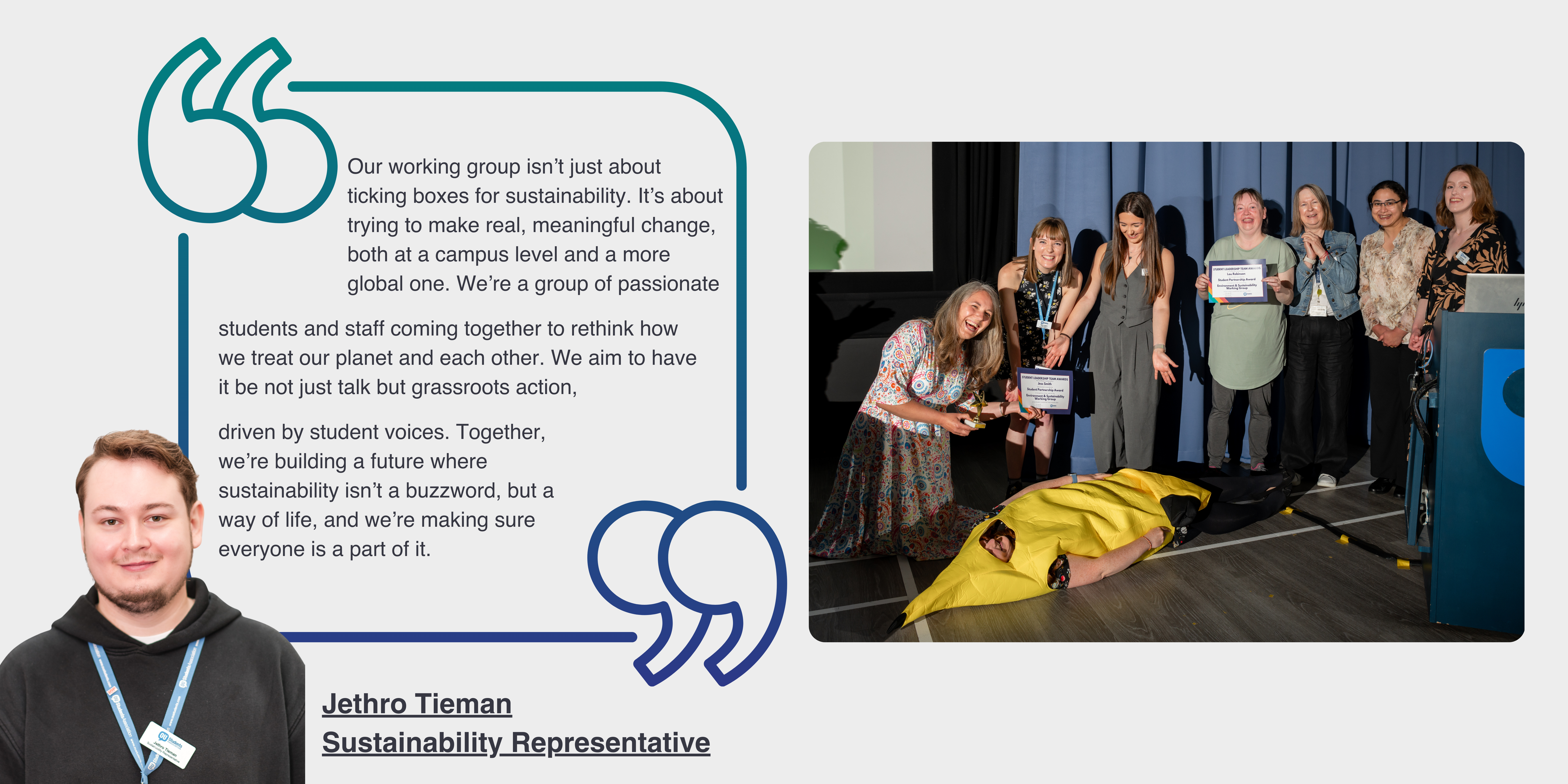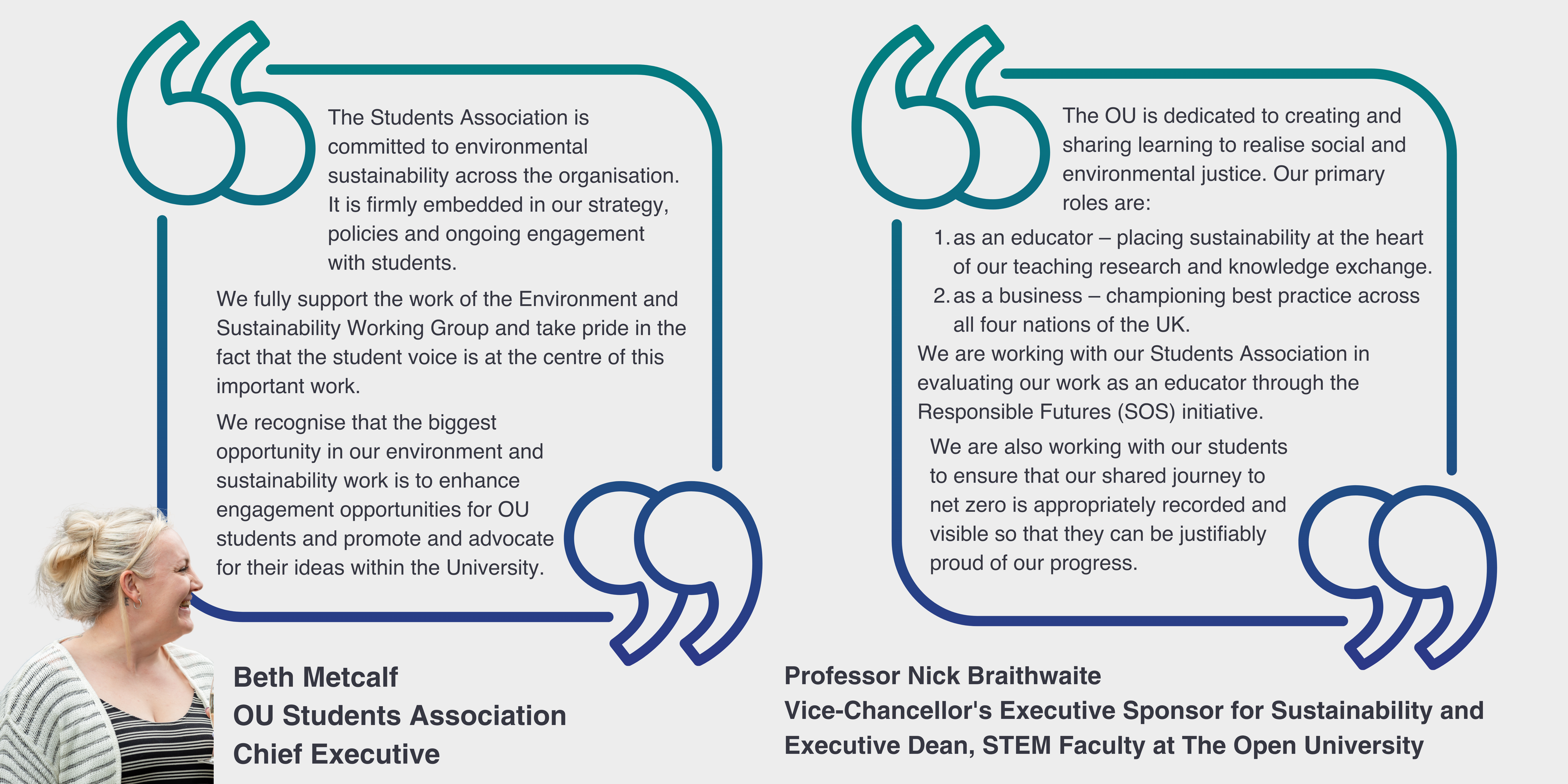
The Environment and Sustainability Working Group is made up of Student Leadership Team members, student volunteers and Association staff who meet monthly to discuss all things sustainability.
The Group was formed in September 2022 and was set up to recognise environmental and sustainability-related issues, discuss what the Association and University can improve on, create events and campaigns and much more.

How we define sustainability
Our definition of sustainability is based on John Elkington's Triple Bottom Line (1994) which states that an organisation is only sustainable when it focuses on the following three areas in combination: people, planet, and prosperity. Actions taken in these areas interrelate and move us further towards social, economic, and environmental sustainability.
Sustainability at the OU Students Association means we will undertake our mission to improve the OU student experience whilst ensuring the organisation is in the best possible position to achieve that mission for future generations of students. It means we will use the earth's resources in a responsible way to minimise negative impact and will empower the student voice to influence decision making throughout the University.
The importance of sustainability
Students Association Chief Executive Officer, Beth Metcalf, outlines the importance of our work in this area:

Our Action Plan
The Group has developed an Action Plan to guide our short, medium and long-term actions.
Our Action Plan is split into four strands:
- Impact – reduce and mitigate the impact the Students Association has on environmental sustainability through its working practices.
- Engagement – encourage students to engage in, think about and contribute to our goals for this group and environmental sustainability more broadly.
- Policy – create a Students Association Policy on environmental sustainability.
- The University – establish the Association's position on the OU's actions relating to environmental sustainability.
Underpinning principles
- We, The Students Association Environment and Sustainability Working Group, acknowledge the challenges of living sustainably.
- We recognise that balance is needed in all things – particularly when considering environmental sustainability at the Association and within the University. We know that many students need physical books to study, we know that face-to-face meetings give huge benefits in building relationships and that a thank you email can be hugely important.
- We seek to encourage and empower through positive actions – never through shame or judgement.
- We want to highlight that small actions can make a big difference.
Progress markers
- Red = not yet started/action required
- Amber = more work to do
- Green = project on track
Last updated: August 2024
Action one: How can we reduce and mitigate the impact the Students Association has on environmental sustainability through its working practices?
Short term
- Baseline impact – Assess current status using Net Positive Futures Framework. (Amber) and involve students in impact research. (Amber)
- Waste reduction – Reducing waste – work with Go Green team. (Amber)
- Carbon saving – Can we reduce our emails? Calculate & share statistics on carbon saved through online meetings.(Red)
Medium term
- Environmental Impact Assessment – Embed assessment of environmental impact into all activities of the Association. (Red)
- External Engagement – Keep up to date with new initiatives/innovation from Government/organisations. (Amber)
- Association events – Hold events across the four nations and internationally to reduce travel (Green) and Also consider hybrid/online alternatives for environmental and accessibility reasons. (Green)
Long term
- Carbon Offsetting – Consider use of offsetting carbon where it is not possible to eliminate impact. (Red)
Completed actions
- We have held events across the four nations and internationally to reduce travel.
- We have considered hybrid and online alternatives for environmental and accessibility reasons.
- To celebrate the first 250 registrations for Conference, we organised the planting of 250 trees via One Tree Planted.
Action two: What can we do to get students to engage in, think about and contribute to our goals for this group, and environmental sustainability more broadly?
Short term
- Website – Create an Environment and Sustainability webpage. (Green) and Include an ideas bank with explanations for students and a Resource hub with links to carbon footprint calculators etc. (Green) see the web hub
- Events – Listen to students – what are their concerns? What do they want us to be doing?(Green) And Linking staff and students – Responsible Futures, Earth, Environment events (Green) And Sustainable prizes at our existing events (Green) ideas bank Resource hub
- Carbon saving – Can we reduce our emails? Calculate & share statistics on carbon saved through online meetings.(Red)
Medium term
- Campaigns
- Raise awareness – e.g. social media campaign for Great Big Green Week 2023 (Amber)
- External Engagement – Keep up to date with new initiatives/innovation from Government/organisations. (Amber)
- Competitions – upcycle/recycle, reducing carbon impact over a month. (Amber)
- Encourage students, volunteers and staff to consider individual carbon footprint. (Amber)
- Volunteering
- Creation of a Sustainability Champion role. (Amber)
- Build skills/experiences for students in the sector - for both personal and career development. (Amber)
Long term
- Carbon Offsetting – Consider use of offsetting carbon where it is not possible to eliminate impact. (Red)
Completed actions
- We completed the Environment and Sustainability web hub including an Ideas bank and a Resource hub.
- We have spoken to students to find out what they are concerned about and ask what they want to see us doing. For example, in the Annual Membership Survey, the Great Big Green Week and Student Voice Festival.
- We have enjoyed connecting staff and students at events organised such as inviting OU staff to speak at our panel events. Staff prioritise ordering freebies that are made from recycled materials for Association events.
- We have promoted the carbon literacy training to OU students and Association staff through various channels including the Hoot and on our Resource hub.
- We have created a brand new Sustainability Representative role on our Student Leadership Team!
- For our amazing volunteers, we included 'Sustainability Champion' as one of the award categories in our Student Leadership Team Awards this year. The Environment and Sustainability Working Group also won the award for the best student and staff partnership! We have also nominated the Working Group's previous chair, Lou Robinson, for a Green Gown Award and Lou is a finalist!
Action Three: What is the Students Association's Policy on environmental sustainability?
Short term Read our environmental sustainability policy
- Stakeholder mapping – Amber
- Policy Review – Review existing policies at the Association (Green)
- Review Enivronmental and Sustainability Policies at other SUs and membership organisations which might better reflect our unique online/hybrid way of working. (Green)
Medium term
- Stakeholder consultation – Amber
- Policy drafting – Green
- Association strategy – Advocate for Sustainability to be a core aspect of Association Strategy for 2023-2027. (Green)
Long term
- Embedding policy and practice – Build sustainability actions and activities as part of business as usual. (Amber)
- Review & update - Schedule an annual review and update of the policy as part of the Terms of Reference of the Working Group. To include relevance, successes and room for improvement. (Red)
Completed actions
- The Association's Travel and Subsistence Policy has been updated with sustainability considerations.
- We have reviewed Enivronmental and Sustainability Policies at other student unions and membership organisations which has helped us develop our policy.
- Sustainability is now included in the Association's strategic aims and values in our Strategy.
Action Four: What is the Association's position on the OU's actions relating to environmental sustainability?
Contact the Environment and Sustainability Working Group